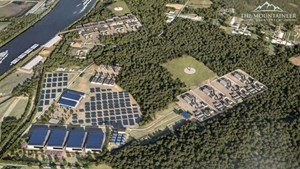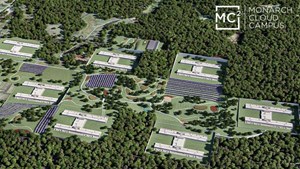News
Fidelis New Energy selects West Virginia for lifecycle carbon-neutral H2 project
Fidelis New Energy selected of Mason County, West Virginia for a lifecycle carbon neutral (net-zero) H2 production facility and low carbon microgrid—the Mountaineer GigaSystem (Mountaineer) and the Monarch Cloud Campus for data centers powered by net-zero H2. Mountaineer will be implementing the proprietary FidelisH2 technology that enables production of H2 with zero lifecycle carbon emissions from a combination of natural gas, renewable energy, and carbon capture, utilization and sequestration (CCUS).
As one of two high impact industrial business districts in West Virginia based on Code 5B 2-21, the project consists of four phases with each phase producing over 500 metric tons per day (tpd) of net-zero carbon H2 at an approximate capital cost of $2 B per phase excluding associated investments in data centers, greenhouses, etc. The first FidelisH2 phase of the Mountaineer GigaSystem is expected to commence operations in 2028.
This net-zero carbon H2 will be used for a variety of purposes including carbon neutral hyperscale datacenters, greenhouses, transportation and steel production.
The incentive package from the West Virginia Department of Economic Development enables Mountaineer to conduct additional geologic evaluation for carbon capture and sequestration (CCS) required for the permits needed to conduct CCS activities. These activities will serve as the foundation for the clean H2 and CCS industries in the state, providing a source of jobs and generating state revenue for CO2 volumes stored safely and permanently underground. Fidelis has a demonstrated history of leadership within the CCUS space, with experience in partnering and developing carbon storage assets on the Gulf Coast of the U.S. and in Europe. When all four phases of the Mountaineer GigaSystem are operational, approximately 10 MM metric tpy of CO2 would be permanently stored, providing over $100 MM/yr in revenue to West Virginia or ~$25 MM/yr per phase.
"I am beyond excited that West Virginia will be the home of the Mountaineer GigaSystem and Monarch Cloud Campus," Governor Justice said. "West Virginia has a long history as an energy powerhouse for our nation, thanks to our hardworking people who know how to get the job done. And now, we're in a great position to make the most of a new fuel, H2, through this incredible project in Mason County. There's simply no doubt that Fidelis is going to help shape the future of West Virginia in a major, major way by assisting in the commercial lift-off of some truly exciting new industries.
"During my time as Governor, West Virginia has seen many major economic development wins, which have contributed to the diversification of our economy and the fostering of the most business-friendly environment in the nation. Fidelis's selection of West Virginia for their projects adds another huge win to our growing track record of success, and I thank all those involved in bringing this project to fruition."
John Musgrave, the Executive Director of the Mason County Development Authority said, "The citizens of Mason County are elated with the announcement of Fidelis New Energy selecting Mason County, West Virginia, for its multibillion-dollar state of the art carbon neutral, clean H2 complex. The selection of the Mason County site is the result of a team effort with National, State and County teams working together to bring this outstanding international company to West Virginia."
Musgrave said, "The project's four-phase construction plan will not only provide substantial employment opportunities for the local workforce, with 800 full-time jobs and 4,200 construction workers, but it will also have a major positive impact on the region's economy. The influx of workers and the establishment of the facility will bring additional business, industry and new technology to Mason County, the state and the surrounding region. This excludes the employment in data centers and greenhouses."
Fidelis and West Virginia have finalized the operating agreement which determines the terms for the targeted storage capacity and the pore space agreement establishing exclusive rights for CCS in certain areas.
Energy transition technologies. Fidelis has a suite of patent pending energy transition technologies that assist in the decarbonization of hard to abate industries. FidelisH2 is a novel H2 production pathway that enables lifecycle carbon neutral H2 from natural gas and renewable energy. Fidelis' suite of energy transition technologies also includes H2PowerCool and CO2PowerGrow. H2PowerCool utilizes FidelisH2 H2 as a net-zero energy source to power and cool data centers, enabling carbon-neutral data centers that can be hosted onsite at Mountaineer without utilizing offsite indirect carbon offsets or credits.
The technologies will be used by data centers at the Monarch Cloud Campus on land secured by Fidelis within the Mountaineer site and additional acreage within Mason County. Fully built out, the data center capacity could reach 1,000 MW, representing more than $5 B in additional investment. Waste heat and a portion of the captured CO2 from FidelisH2 production and waste heat the hyperscale data centers would be used as inputs to co-located greenhouses to decarbonize and lower the cost of food production.
"By combining several proven technologies from leading providers including our FidelisH2 partners Topsoe and Babcock & Wilcox, we are able to produce lifecycle carbon free clean H2 at scale, without taking new technology risk. Our proprietary net-zero solutions using only proven technologies are attracting significant commercial interest from H2 users, data center operators and greenhouse owners. This helps the ARCH2 hub to achieve scale across the H2 lifecycle from production through consumption," said Bengt Jarlsjo, Co-Founder, President, and Chief Operating Officer at Fidelis.
In conjunction with the broader project unveiling, Fidelis also announced a letter of intent with Babcock & Wilcox (B&W) to support the evaluation, development, and delivery of BrightLoop H2 projects at the Mountaineer site. This targets a full build out of four 200 MMtpd of net-zero H2 production facilities. The BrightLoop technology enables the production of cost competitive clean net-zero H2 from waste biomass including fallen trees, sawmill waste and other solid fuels as well as natural gas combined with CCUS, making it a highly synergistic addition to the Mountaineer GigaSystem site.
West Virginia, ARCH2 and Federal Support. Fidelis is pleased to be a Project Development Partner through Mountaineer in the Appalachian Regional Clean H2 Hub or ARCH2, a regional hub bringing together private industry, state and local government, academic and technology institutions, NGOs, and communities across the Northern Appalachian region to develop an interconnected, full value chain H2Hub solution in support of the U.S. Department of Energy's vision of a national clean H2 network. Additionally, projects like Mountaineer and the economic impact they will bring to host states such as West Virginia would not be possible without the energy security and transition incentives passed by Congress in the Inflation Reduction Act. These provisions, including the Section 45V Production Tax Credit and 45Q Carbon Capture Tax Credits ensure the economic viability of projects that both increase energy security for the United States and incentivize energy transition.
Regarding the importance of federal support for CCS and H2 projects, Senator Joe Manchin, Chairman of the U.S. Senate Energy and Natural Resources Committee said, "The Inflation Reduction Act continues to deliver for West Virginia, and I am pleased that Fidelis New Energy has chosen Mason County, West Virginia for the home of its new Mountaineer GigaSystem. West Virginia has long been America's energy powerhouse, and thanks to the Inflation Reduction Act, the Mountain State will continue contributing to our Nation's energy security while growing as a hotbed of energy innovation with this announcement and many more to come. This project will benefit West Virginia workers and their families, and I cannot wait to see the new opportunity Fidelis New Energy will bring to Mason County. There truly is no better place to do business than Wild and Wonderful West Virginia."
U.S. Senator Shelley Moore Capito said, "As one of the architects of the Infrastructure Investment and Jobs Act, I am pleased to see the investments that are being made in the state as a result of this important legislation. West Virginia is well positioned to lead by example in developing a regional H2 hub, which is why I have been a strong supporter of the Appalachian Regional Clean H2 Hub (ARCH2). I look forward to seeing its members continue to make investments like this and bring much needed jobs and associated economic development to the state."
Major General (retired) Jim Hoyer, a Fidelis Advisory Board member and West Virginia University Vice President for Economic Innovation said, "I am proud that the Fidelis New Energy team has selected Mason County, West Virginia for this next generation energy project. Thanks to Dan, Bengt and Pete and the entire Fidelis team for their diligent effort to make this happen. This will allow West Virginia to continue to be an energy leader while creating new energy technology jobs for our citizens and be a keystone to our "all in" energy strategy. It is also a great example of how West Virginia leaders work together to make things happen for our state. This project required vision and leadership at all levels to make it happen including Senator Manchin's and Senator Moore Capito's national energy and infrastructure vision and leadership, Governor Justice's economic development vision and leadership and the vision and leadership of Senate President Blair and Speaker Hanshaw and their members. It also required diligent work from the state and local staff level to include John Musgrave and the Mason County team. We look forward to Fidelis creating many great economic opportunities for our state!"
"We are proud to have selected West Virginia as home to the Mountaineer GigaSystem where it can serve as a major anchor and support for the broader ARCH2 H2 Hub. The state's position at the forefront of energy and chemical production in the United States make it a natural choice for a project such as ours," said Pete Hollis, Senior Vice President and Global Head of CCUS of Fidelis.
Dan Shapiro, CEO of Co-Founder of Fidelis said, "Fidelis is extremely appreciative of committed West Virginian and Fidelis Advisory Board member, Major General James Jim Hoyer, who passionately advocated for us to implement our FidelisH2 H2 technology in the Mountain State and introduced us to many of the people who have collaborated with us to make this announcement possible. We would like to express our gratitude to Governor Jim Justice and his administration, including Director Mike Graney, Secretary Mitch Carmichael, the West Virginia Economic Development Authority, and Mason County Economic Development for recognizing the value the Mountaineer GigaSystem and the Monarch Cloud Campus bring to West Virginia."
West Virginia has made great strides in positioning itself as a global leader in CCUS by leveraging its geology and passing laws that make West Virginia competitive with other states. Shapiro added "We are grateful to Governor Justice as well as Speaker of the House of Delegates Roger Hanshaw and Senate President Craig Blair for their roles in positioning West Virginia as a leader in the growing CCUS industry through the laws enacted in the prior regular legislative session regarding CCUS."
Given the importance of the federal incentives to this project as well as to the ARCH2 H2 hub, Shapiro concluded, "This project and many other H2 projects, including those within ARCH2, would not be possible without the leadership from Senator Joe Manchin for the energy security and energy transition incentives passed in the Inflation Reduction Act. Support from Senators Shelley Moore Capito and Joe Manchin for the bipartisan Infrastructure Investment and Jobs Act was crucial for enabling the H2 hubs, and we laud their continued efforts to streamline the permitting process for critical infrastructure projects across the U.S."



